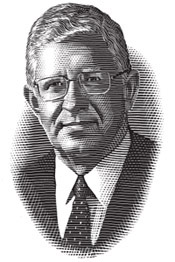|
||
     |
From the President: A clear need for honesty
President Don M. Randel finds poetry in the active practice of telling the truth.
 Richard
Wilbur’s poem “Clearness” begins this way: “There
is a poignancy in all things clear,/In the stare of the deer, in the ring
of a hammer in the morning./Seeing a bucket of perfectly lucid water/We
fall to imagining prodigious honesties.”
Richard
Wilbur’s poem “Clearness” begins this way: “There
is a poignancy in all things clear,/In the stare of the deer, in the ring
of a hammer in the morning./Seeing a bucket of perfectly lucid water/We
fall to imagining prodigious honesties.”
Prodigious honesties are the enabling condition of everything that matters most about the University. Absent honesty, the search for truth has no meaning, and the dissemination of knowledge within the community and to other individuals and communities is equally meaningless.
At this University, furthermore, we understand that honesty is not a passive quality. To be honest is not simply never to tell a lie. To be honest is actively to tell the truth, even when listeners may be resistant to hearing it. This is fundamental to the spirit of debate that we so value and has characterized the University and some of its greatest leaders at moments of considerable social and political pressure.
Not only must we actively speak the truth to the extent that we can honestly claim to know it. We also must ask the questions that might reasonably lead us to a better understanding of the truth. In principle, nothing can be off-limits, so long as we are guided by a fundamental honesty in the pursuit. This does not, of course, imply an obligation to be tactless or insensitive.
In spheres where the goal is not straightforwardly the search for what can reasonably be called the truth, the importance of honesty is perhaps less obvious. It often seems not to be very important at all. But every sphere of human activity, from the most public to the most private, must also rest on a foundation of prodigious honesties. There can be no truly free markets without honesty, and there can be no true democracy without honesty. Love surely requires honesty as well. The greatest good for the greatest number requires it, and the profoundest good for the individual requires it, too.
This past September President Randel delivered
the 42nd annual Aims of Education address; the
text of his address to the College Class of 2008
is now available. President Randel’s
address
begins on page 24.
Alas, we seem to live in an age of prodigious dishonesties, which are often justified as the means to important ends, such as increasing shareholder value or establishing a political or ideological position, sometimes upon others against their will. The remedy will seem to some to be legislative, as if we could succeed in making people honest by threatening them with extraordinarily complex rules. The Sarbanes-Oxley Act, which ought to be called the Universal Auditors’ Employment Act, is a case in point.
To others the remedy will be to oblige every student everywhere to take a course with the term “ethics” somewhere in the title. But if ethics, including honesty, is taught only in courses with those terms in the title, we will have given up on much that education, properly so called, has been thought to mean. Every course that teaches something about how to increase the store of one’s knowledge necessarily relies on the honesty of the pursuit. At the most practical level, if the course called “Accounting” has not made clear its foundation on prodigious honesties, no number of courses called “Ethics” will make good that defect.
Rather than requiring of everyone courses with “ethics” in the title, perhaps we should require everyone to study poetry. Richard Wilbur’s poem addresses honesty with a power not easily equaled. Perhaps some of the celebrities now in the dock for prodigious dishonesties would have benefited from, with Wilbur, looking into the stare of the deer, from hearing the ring of a hammer in the morning, from seeing a bucket of perfectly lucid water and imagining prodigious honesties. Perhaps our students, absorbing such lines, will have a richer sense of honesty than the fear of any federal prosecutor might inspire.
I wrote once before that the boundary between theory and practice tends to become obscure upon examination and that what we study at the University, and the ways in which we study it, bear directly on real life itself. This is true even in, or perhaps especially in, the humanities. We ask young people (and recommend it for older people too) to read poems and novels and philosophy and history because they contribute directly to our understanding of what it means to be a human being and how we ought to behave in relation to one another.
The next time you see that face on the front page of the newspaper, photographed on the courthouse steps, you might ask yourself whether the subject reads much poetry.